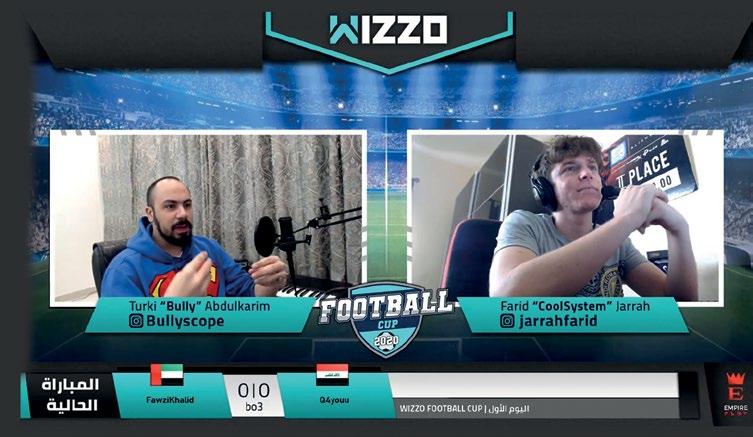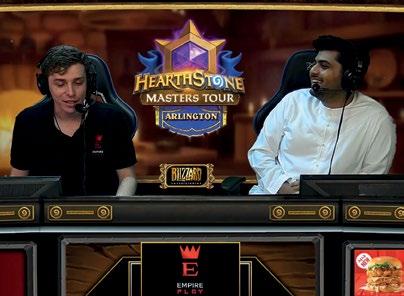
4 minute read
Empire Play - Bringing MENA esports into the limelight
Author: Andrew Hayward
In 2019, Empire International marked a century in the entertainment industry, currently serving as the exclusive distributor of films from Sony Pictures, 20th Century Fox, and Fox Bollywood in the Middle East/North African (MENA) region. To celebrate the momentous occasion, Empire made a move that could help set its course for the next 100 years, establishing esports and gaming division Empire Play.
Advertisement
Dedicated to delivering esports and gaming content in the Arabic language, Empire Play uses its broadcast studio to both produce events and localise content from international competitions. Currently, Empire’s key focus is Hearthstone, working closely with Blizzard Entertainment to produce Arabic streams of international events and having its regional events serve as a direct qualifier for the Hearthstone Masters Tour.
“It’s a big thing, because it’s the first time ever in the region in which any full-year esports calendar is covered in Arabic as an official broadcasting studio,” Empire International Esports Executive Edward Kondrat told The Esports Journal. “We hope that it gives a push towards the whole industry, maybe, and other studios appear and other game titles get covered in Arabic.”
Empire Play also handled the Arabic broadcasts for March’s WePlay WeSave! Charity Play Dota 2 tournament, put on in the wake of the novel coronavirus (COVID-19) spread. The company is now eyeing a number of other esports games and opportunities as it attempts to increase both the flow and quality of esports events and production in the MENA region.
Kondrat points to a number of factors that could lead to greater esports momentum in the region, including a large population of people playing games and the immense number of Arabic speaking people in the world, as well as prominent pro players in games such as FIFA, Tekken 7, and Dota 2.
However, Kondrat suggests that while there is a lot of pro player talent in the MENA region, it isn’t currently being nurtured. “There are only a few team organizations that are trying to scout that talent and build teams around it,” he noted. It’s one of the challenges that the region faces as it tries to catch up with other parts in the world in terms of esports events, talent, and opportunities. Another issue is a lack of local servers to enable peak performance in some esports games.
“There are definitely multiple challenges that maybe other regions worked through at their initial stage,” said Kondrat. “Here in Dubai, we often have B2B conferences where multiple companies and organisations that are involved around esports are voicing out the challenges that are here. There’s lots of them, starting from the servers: only a few gaming titles have MENA region servers.”
It’s still early days for esports in the MENA region, Kondrat suggests, so it’s also unsurprising that brands still aren’t hip to the benefits and opportunities of appealing to the esports audience. That will come with education, he says, not to mention time and proof of local success and strategies.
“There’s not yet a well-developed understanding from brands. They’re not yet educated on the aspect of esports, some don’t yet understand the importance or the efficiency of reaching the young audience through esports, thus there’s not enough budgets allocated yet for online or physical events,” he explained. “Also, there are not many experts who can clearly understand their business strategy here in the region. For example, we don’t see a success story of any company that would work here for several years and show success, and show that they know exactly what they need to do to succeed in this industry and in the region.”
The COVID-19 pandemic has thrown another wrench in Empire’s plans, much like the rest of the esports industry around the world, cancelling plans for live events and forcing their team to adapt to the changing short-term landscape. Increased internet usage throughout the region has also put a strain on networks.
“In some countries such as Lebanon and Egypt, there’s a significant overload of internet networks,” Kondrat detailed. “For example, when we recently did the livestream of the WePlay tournament,

we had lots of feedback from players in that region that they cannot really watch the livestream on Twitch, and the maximum quality that their internet is currently able to pull out is 144p. That’s a huge challenge, because a significant portion of our audience cannot actually reach the platform where we’re trying to broadcast.”
Empire Play has responded by shifting tournaments online, having its broadcast talent work from home, and taking part in bringing charity initiatives to the MENA audience. The short term


will undoubtedly bring more obstacles as the world adapts to and overcomes the COVID-19 pandemic, and as Kondrat explained, there are larger regional challenges to work through in the coming years.
Still, he is optimistic that Empire Play is well-positioned to capitalise on the potential for esports in the MENA region, and bring Empire International’s centuryplus of entertainment experience and knowhow to this budding global industry.
“We’re trying to be one of the leaders in terms of Arabic content, whether it’s live broadcast or certain VOD content,” Kondrat affirmed. “We believe that we’ve found our niche and are trying to progress in it.”




